About this Research
CompTIA’s HR Perceptions of IT Training and Certification was conducted to further explore how employers perceive and use certifications, more specifically from the human resources (HR) point of view. The objectives of this research include:
- Assess employer understanding and perceptions of professional certifications
- Evaluate how certifications are used in the hiring process
- Assess how certifications factor into advancement opportunities and career development
- See how perceptions compare to past findings
The study consists of four sections.
Section 1: Hiring Overview
Section 2: Certification Awareness and Usage
Section 3: Value of Certification
Section 4: Organizational Support for Professional Development
This quantitative study consisted of an online survey fielded to HR executives, managers and professionals in the U.S.* during September 2014. CompTIA employed the services of a dedicated research panel provider to procure the sample. A total of 400 organizations participated in the survey, yielding an overall margin of sampling error at 95% confidence of +/-4.9 percentage points.
Sampling error is larger for subgroups of the data. As with any survey, sampling error is only one source of possible error. While non-sampling error cannot be accurately calculated, precautionary steps were taken in all phases of the survey design, collection and processing of the data to minimize its influence.
CompTIA is responsible for all content contained in this report. Any questions regarding the study should be directed to CompTIA Research & Market Intelligence staff at [email protected].
CompTIA is a member of the Marketing Research Association (MRA) and adhere’s to the MRA’s Code of Marketing Research Ethics and Standards.
Key Summary Points
- The Association for Talent Development (ATD, formerly known as ASTD) estimates that organizations in the U.S. spent $164.2 billion on employee learning and development in 2012, up from $156 billion in 2011. Note: this figure includes expenditures on things such as operations, trainer salaries, and administrative costs. More than half ($100.2 billion) was spent on the internal learning function, such as staff salaries and internal development costs, with the remaining allocated toward external services such as workshops, vendors, and external training sessions ($46 billion) and tuition reimbursement ($18 billion). It also found that U.S. organizations spent $1,195 per learner on employee training and development in 2012, slightly up from the $1,182 reported in 2011.
- Regarding the IT education market size, IDC pegs this U.S. market at about $6.5 billion for 2014. This includes vendor training (training provided by Microsoft, Cisco, etc.) and training offered by for-profit training companies.*
- Finding the right candidate to fill job openings con8nues to pose a challenge for a great majority of HR managers (93% NET). About two-thirds found the task very challenging over the past 12 months (68%); even higher among small-size organiza8ons (83% for those with 5-99 employees). However, likely due to sheer numbers, large employers (500 or more employees) are more often impacted by factors such as finding candidates with the right level of experience or right “hard” skills. Nonetheless, the adverse effects caused by hiring delays are typically unwelcomed by organizations of any size.
- Most employers report frequently using IT certification as a requirement for certain jobs (72%), professional development / training tool (72%), measure of a candidate’s willingness to work hard and meet a goal (67%), and to confirm subject matter knowledge and expertise (60%).
- HR executives increasingly recognize the value of IT certification. For instance, nearly two-thirds indicate IT certifications are very valuable (66%) compared to only 30% three years ago. Their outlook of IT certification importance has risen as well, as 94% NET expect it to grow significantly (43%) or somewhat (51%) over the next two years, an increase from 84% NET a few years ago (32% and 52%, respec8vely). Additionally, they place a higher value on IT certifications vs. certifications in general (66% vs. 53% very valuable, respectively).
- Benefits HR professionals realize of having IT job candidates with IT certification include saving time and resources in evaluating candidates, ensuring credibility, providing a baseline set of knowledge, and learning faster once star8ng a job. Reported benefits of having cer8fied IT employees include longer retention, higher likelihood of being promoted, and better job performance than non-IT certified staff.*
- Furthermore, most HR managers believe it is important to test after training to confirm knowledge gains (88% NET). And nearly all (98%) cite at least one specific benefit of cer8fica8on testing rather than training by itself such as a better validation of knowledge learned / skills, increased value / credibility of the training, increased / improved knowledge, demonstration of abilities / skills, and knowledge retained for a longer period of time.
- Organizations are fairly split on their level of support for employee professional development. Nearly half have a formal professional development program with a set amount of budget for it (47%), while another 46% of employers indicate professional development is handled on a more informal basis, but they cover some expenses. The remaining either recommend it without covering expenses (5%) or provide no support (2%).
- Again, nearly all employers (98%) recommend at least one type of training for IT employees to improve their IT skills. While half of HR managers report instructor-led training (ILT) off-site is encouraged, a mix of others are recommended by at least one-third such as ILT on-site (39%), conferences (36%), IT certification (34%), and tuition reimbursement (33%). Large firms (500 or more employees) are much more likely to recommend IT certification (63%) than their smaller counterparts or even other training methods.
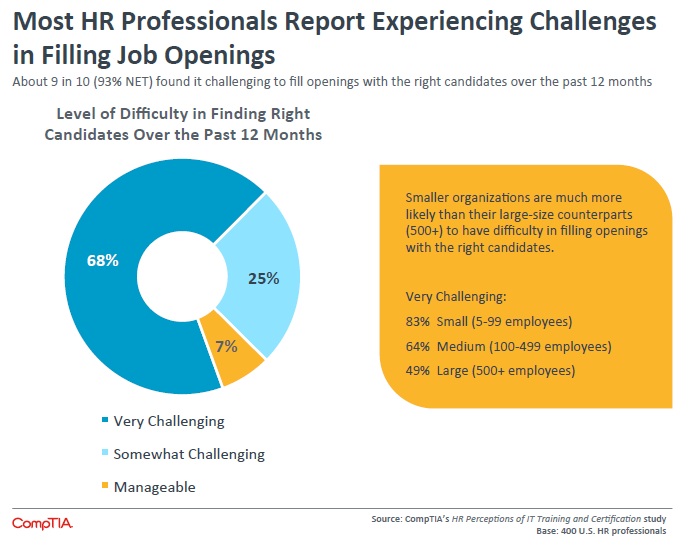
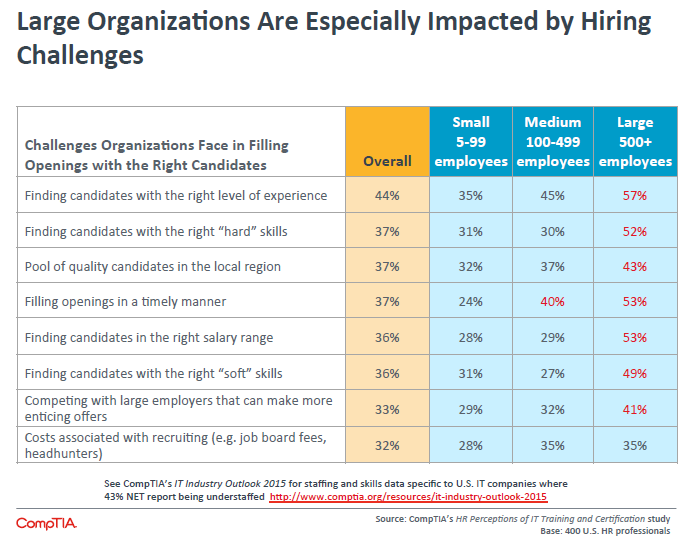

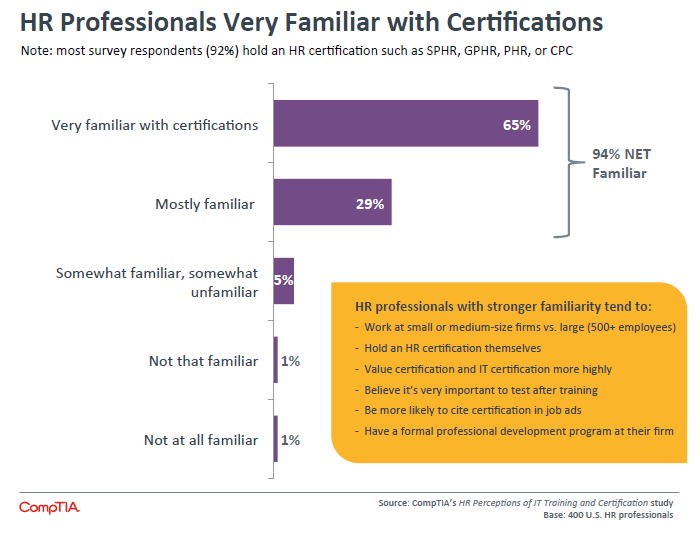
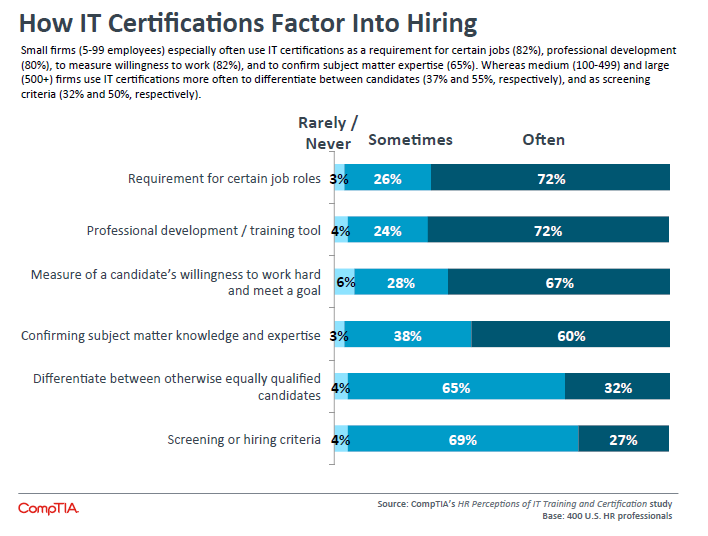
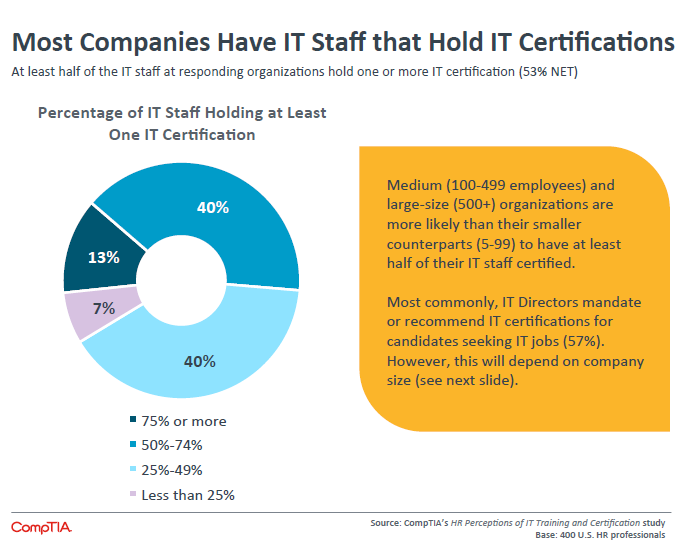
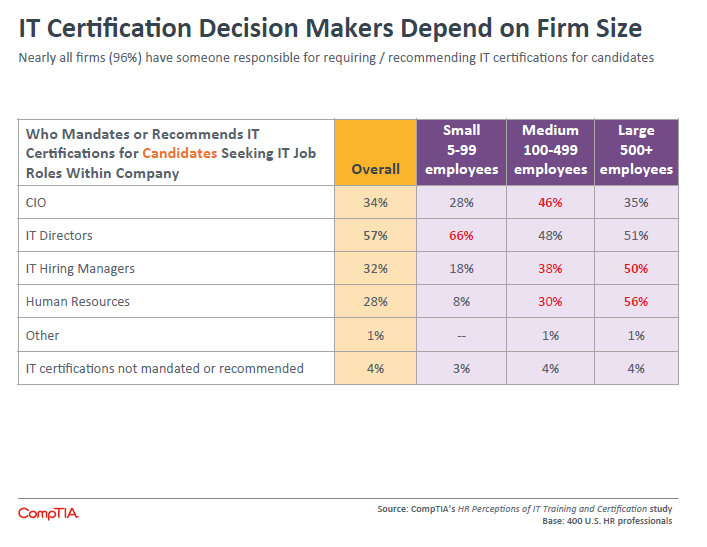
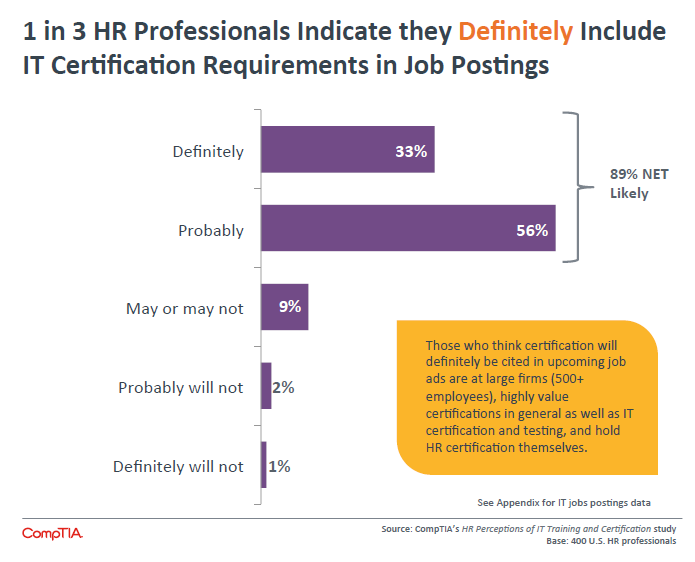
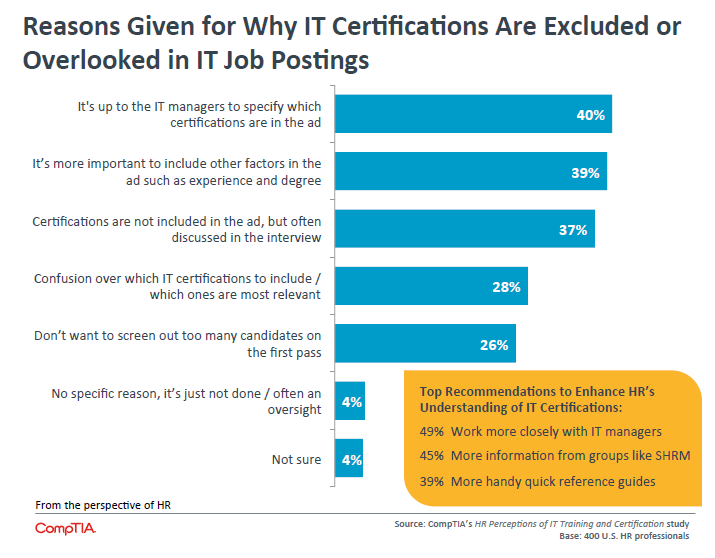
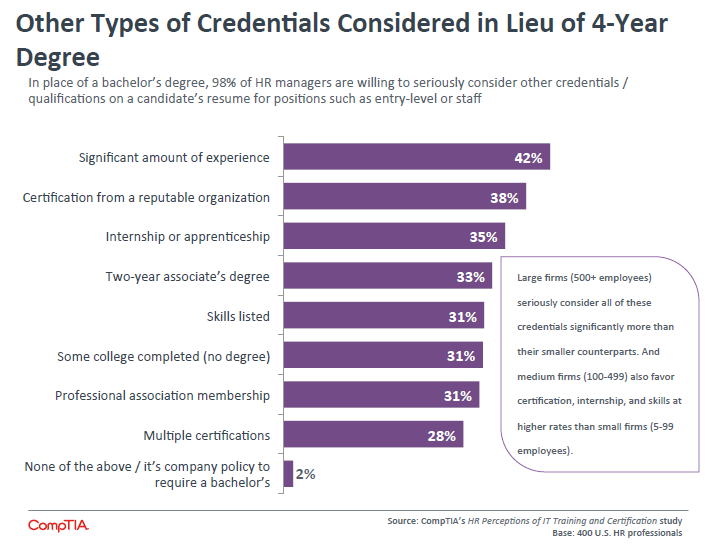
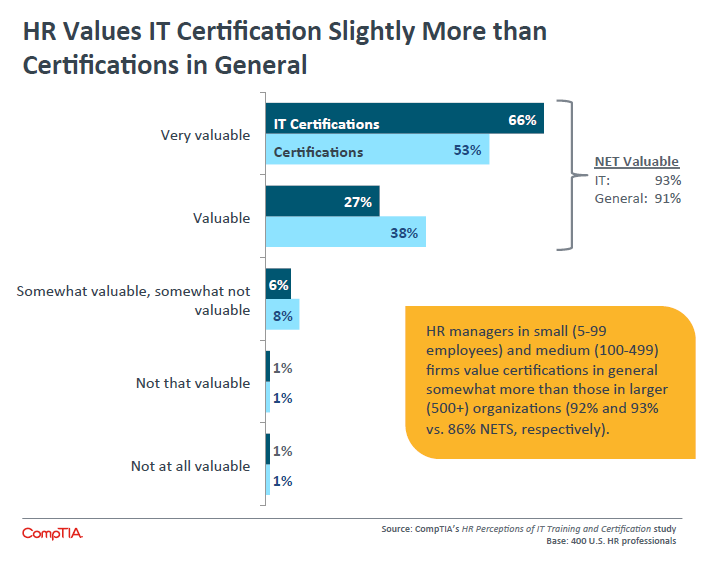
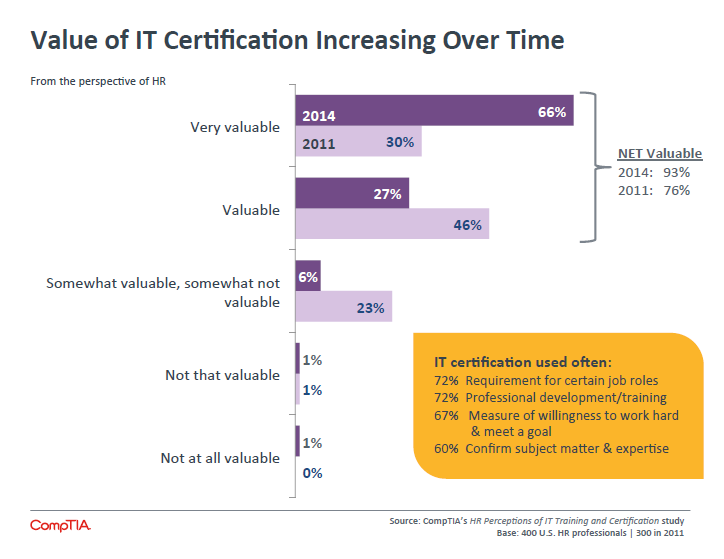
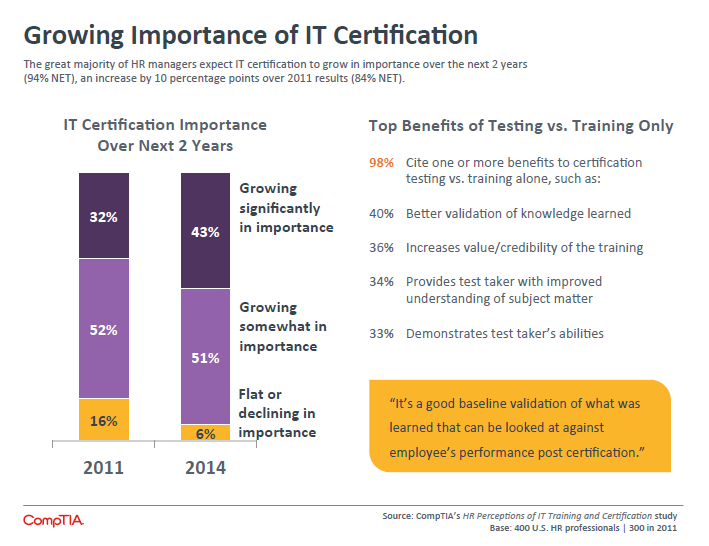
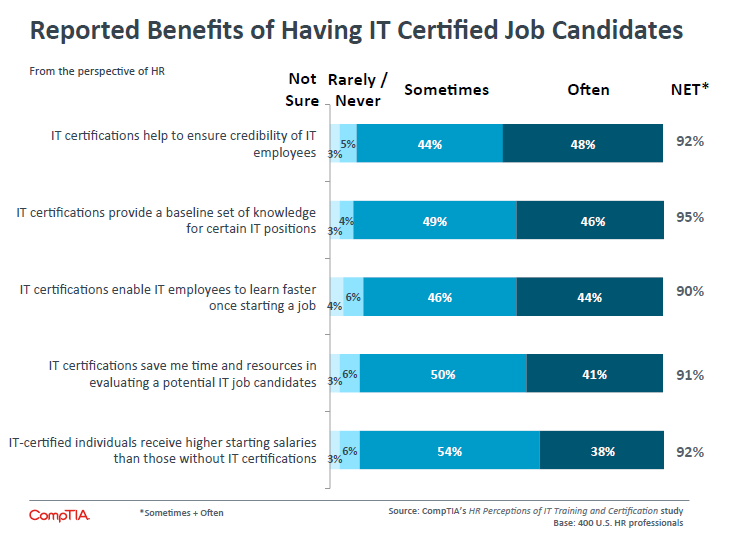
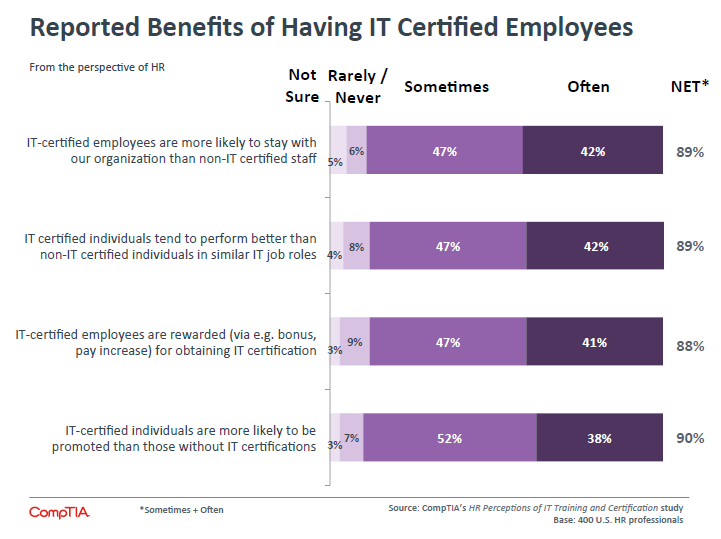
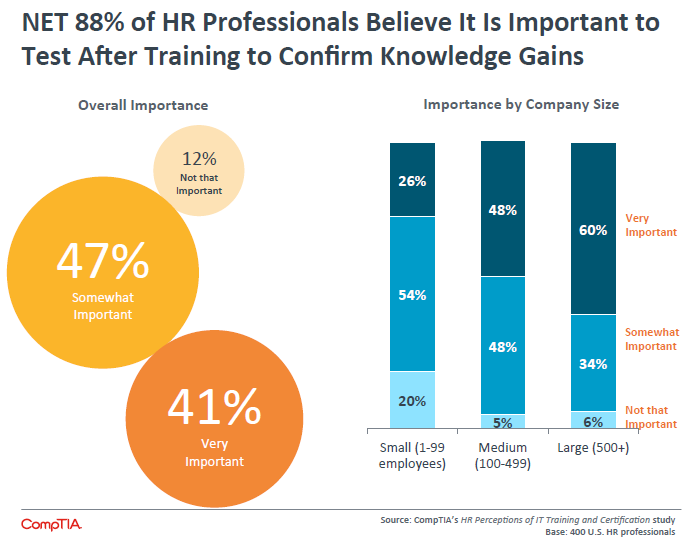

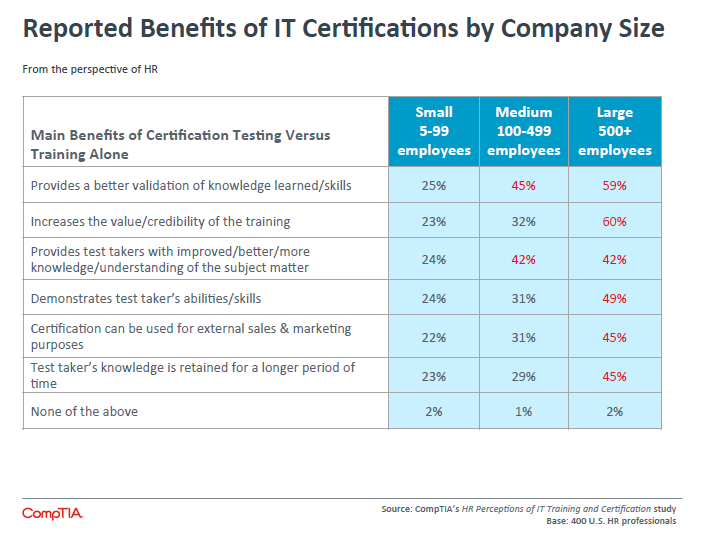
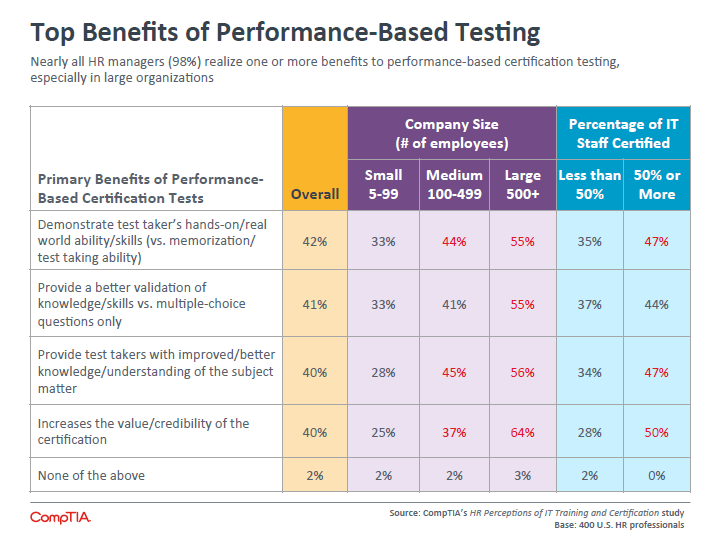
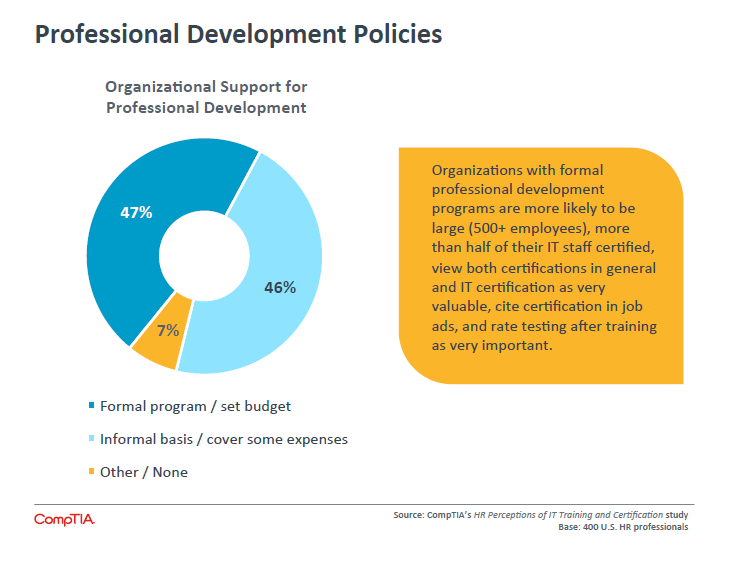
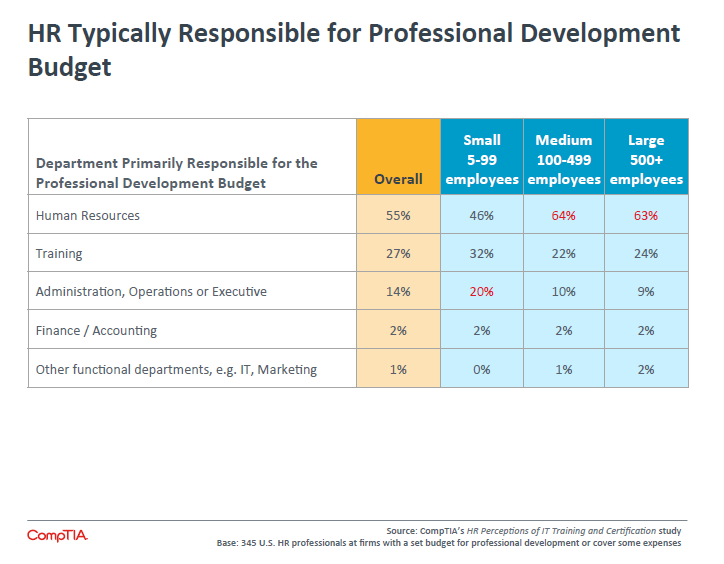
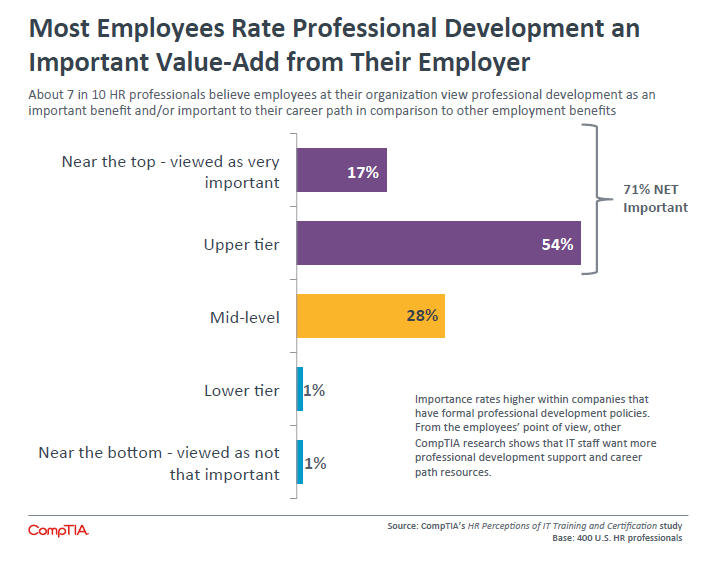
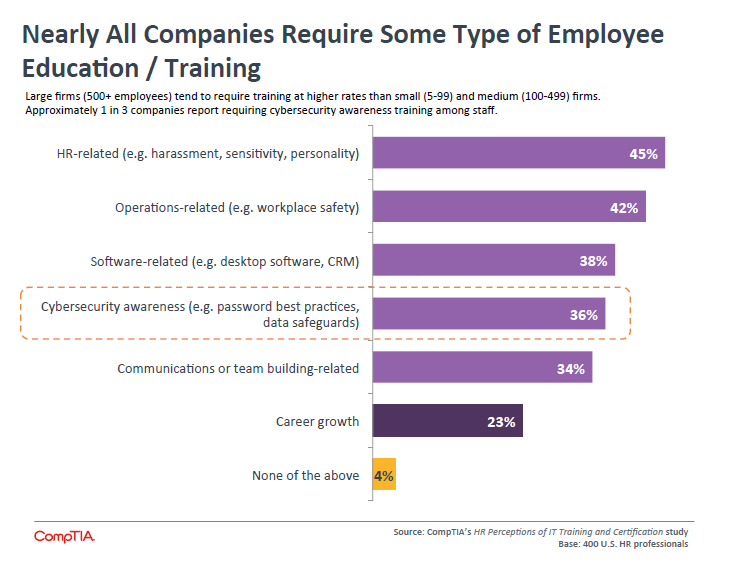
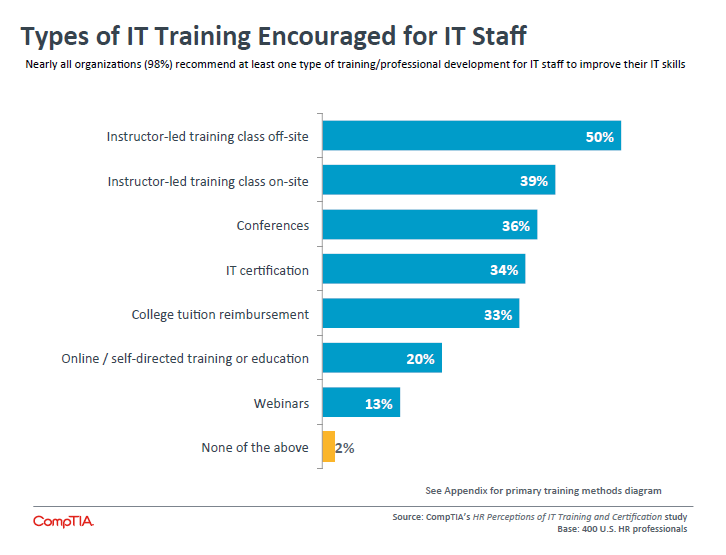
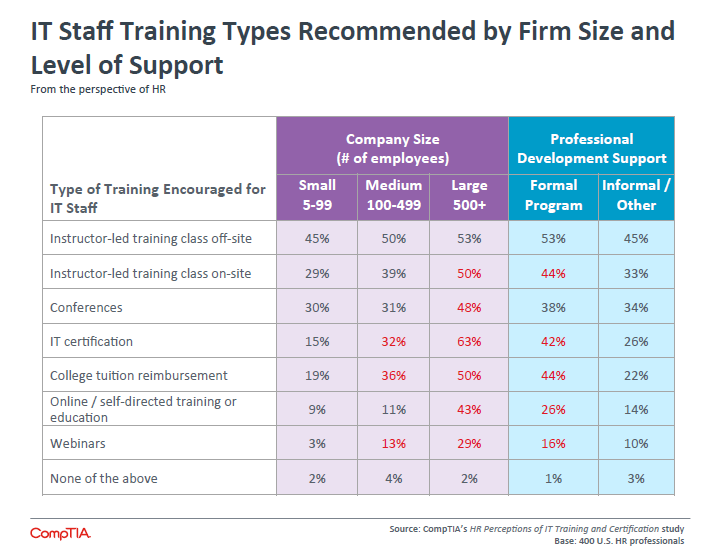
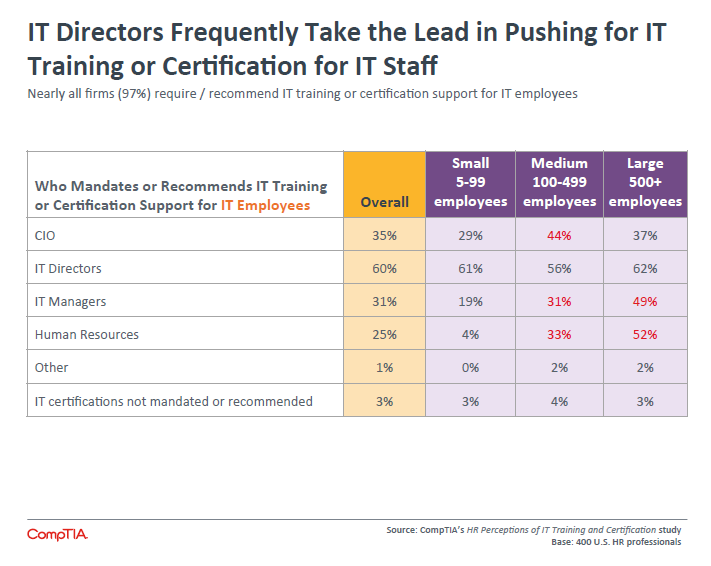
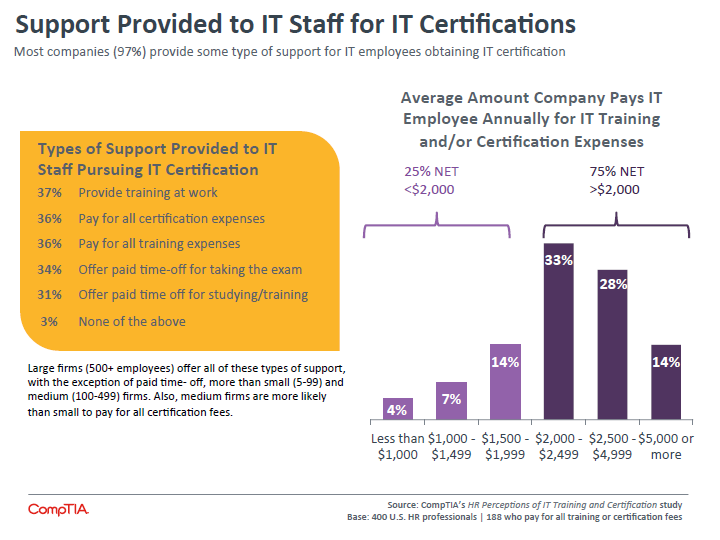
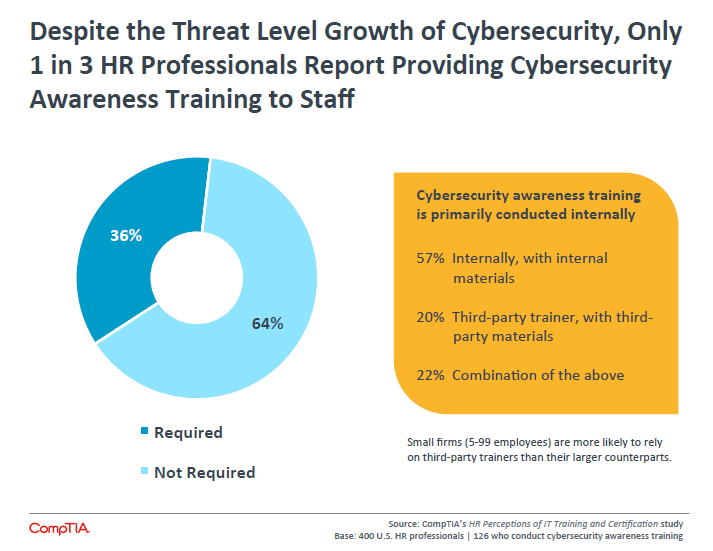
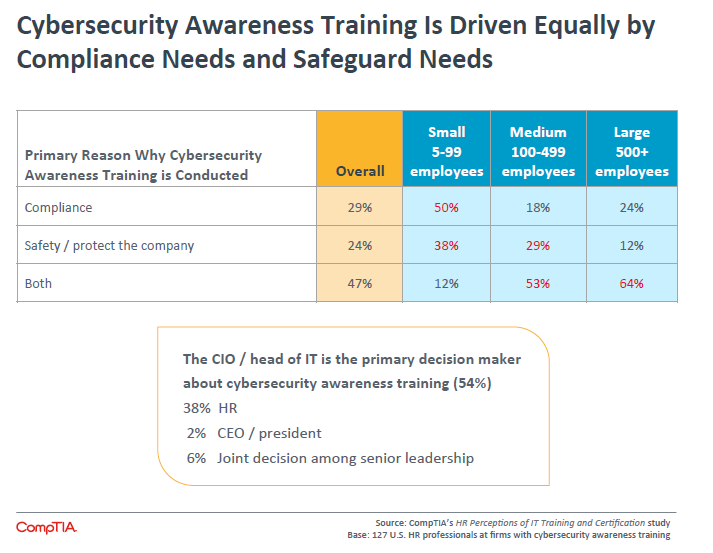
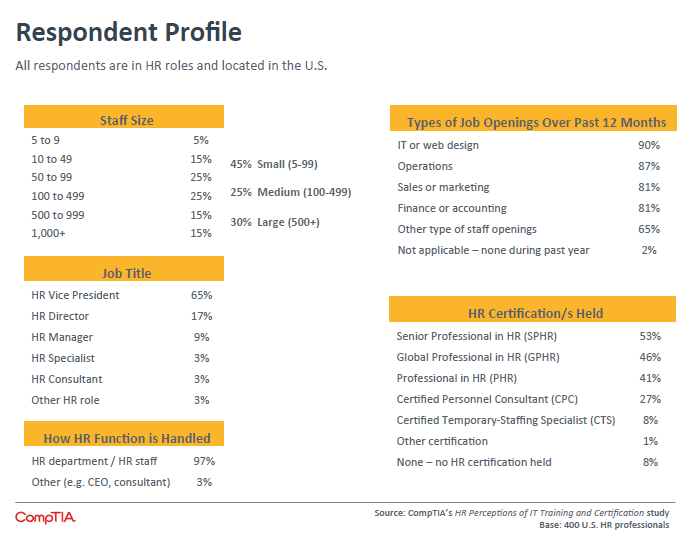
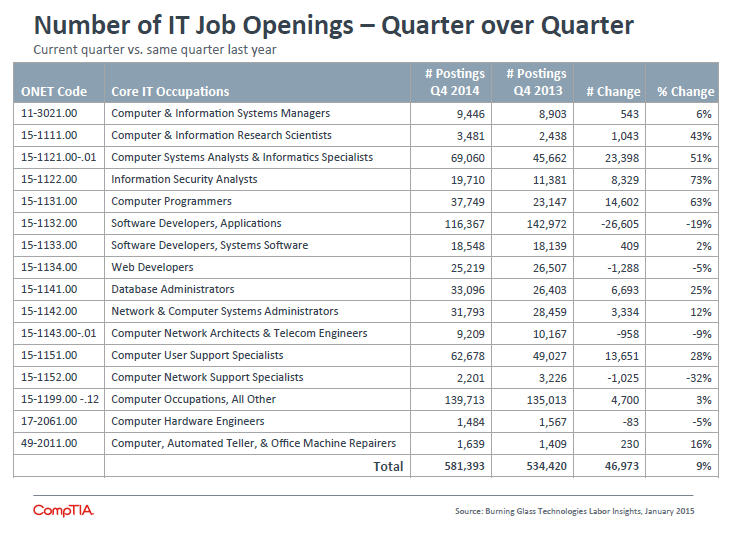
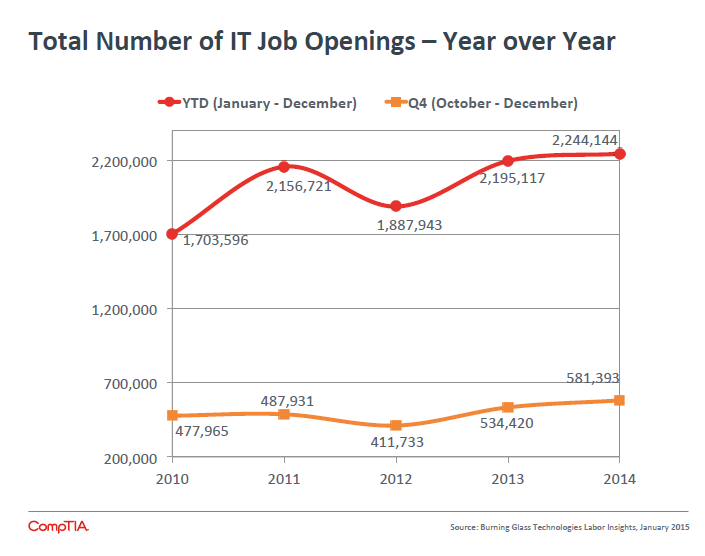

Additional Resources
- CompTIA Insights and Tools: IT Workforce and HR http://www.comptia.org/insight-tools/business?tags=it%20workforce
- IDC IT Support and Security Performance: The Impact of CompTIA Certification on Organizational Performance http://www.comptia.org/resources/the-impact-of-comptia-certification
- CompTIA IT Industry Outlook 2015 http://www.comptia.org/resources/it-industry-outlook-2015
- CompTIA Cyberstates 2015 http://www.comptia.org/resources/2015-cyberstates?c=30250
- Other CompTIA Research & Market Intelligence, for example:
- Quarterly IT Industry Business Confidence Index
- Military Career Path Study: Assessing the role of training and certifications
- Information Security Trends
- International Technology Adoption & Workforce Trends
- Generational Research on Technology and its Impact in the Workplace
- Youth Opinions of Careers in IT
- CompTIA premier members, partners & registered users can access research materials via:
- CompTIA website http://www.comptia.org/insight-tools
- CompTIA Partner Portal http://partners.comptia.org/delivery/research.aspx
Read more about IT Workforce & Diversity, Industry Trends.

 Download Full PDF
Download Full PDF